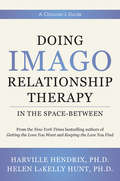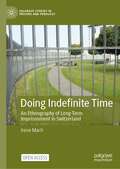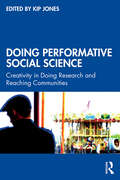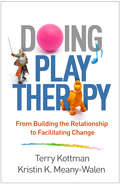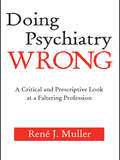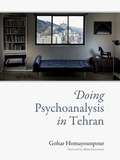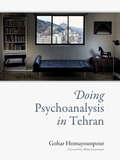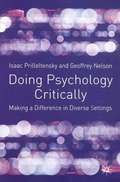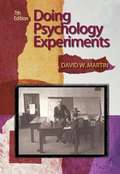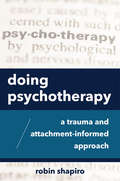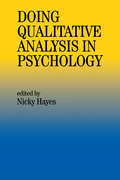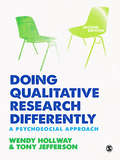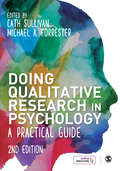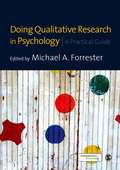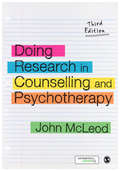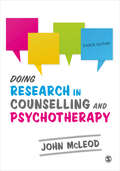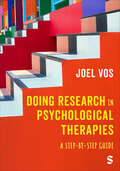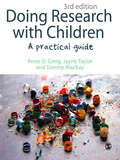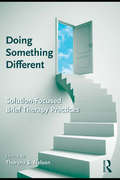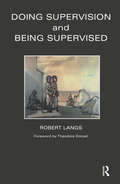- Table View
- List View
Doing Imago Relationship Therapy in the Space-Between: A Clinician's Guide
by Harville Hendrix Helen LaKelly HuntThe first-ever book on Imago Relationship Therapy from its creators geared toward therapists. Developed by Harville Hendrix and Helen LaKelly Hunt in the 1980s, Imago Relationship Therapy helps couples—and everyone in significant relationships—shift from conflict to connection by transforming the quality of their interactions. Now, for the first time, the essential principles and practices of Imago, as illustrated in the New York Times bestseller Getting the Love You Want, are presented for the benefit of both novice and seasoned clinicians. Using the Imago processes, couples create a Conscious Partnership in which they feel safe, fully alive, and joyful, learning to be mutually empathic for each other’s childhood challenges and present to each other without judgement. Hendrix and Hunt help couples learn and practice Imago Dialogue, moving from blame and reactivity to mutual acceptance, affirmation, and empathy, thus deepening their connection. Joining theory and practice with elegance, and filled with examples, exercises, and dialogues, this is a book no couples therapist can afford to be without.
Doing Indefinite Time: An Ethnography of Long-Term Imprisonment in Switzerland (Palgrave Studies in Prisons and Penology)
by Irene MartiThis open access book provides insights into the everyday lives of long-term prisoners in Switzerland who are labelled as ‘dangerous’ and are preventatively held in indefinite, probably lifelong, incarceration. It explores prisoners’ manifold ways of inhabiting the prison which can be used to challenge well established notions about the experience of imprisonment, such as ‘adaptation’, ‘coping’, and ‘resistance’. Drawing on ethnographic data generated in two high-security prisons housing male offenders, this book explores how the various spaces of the prison affect prisoners’ sense of self and experience of time, and how, in particular, the indeterminate nature of their imprisonment affects their perceptions of place and space.It sheds light on prisoners’ subjective, emplaced and embodied perceptions of the prisons' various everyday time-spaces in the cell, at work, and during leisure time, and the forms of agency they express. It provides insight into prisoners’ everyday habits, practices, routines, and rhythms as well as the profoundly existential issues that are engendered, (re)arranged, and anchored in these everyday contexts. It also offers insights into the penal policies, norms, and practices developed and followed by prison authorities and staff.
Doing Performative Social Science: Creativity in Doing Research and Reaching Communities
by Kip JonesDoing Performative Social Science: Creativity in Doing Research and Reaching Communities focuses, as the title suggests, on the actual act of doing research and creating research outputs through a number of creative and arts-led approaches. Performative Social Science (PSS) embraces the use of tools from the arts (e.g., photography, dance, drama, filmmaking, poetry, fiction, etc.) by expanding—even replacing—more traditional methods of research and diffusion of academic efforts. Ideally, it can include forming collaborations with artists themselves and creating a professional research, learning and/or dissemination experience. These efforts then include the wider community that has a meaningful investment in their projects and their outputs and outcomes.In this insightful volume, Kip Jones brings together a wide range of examples of how contributing authors from diverse disciplines have used the arts-led principles of PSS and its philosophy based in relational aesthetics in real-world projects. The chapters outline the methods and theory bases underlying creative approaches; show the aesthetic and relational constructs of research through these approaches; and show the real and meaningful community engagement that can result from projects such as these. This book will be of interest to all scholars of qualitative and arts-led research in the social sciences, communication and performance studies, as well as artist-scholars and those engaging in community-based research.
Doing Play Therapy: From Building the Relationship to Facilitating Change (Creative Arts and Play Therapy)
by Terry Kottman Kristin K. Meany-WalenCovering the process of therapy from beginning to end, this engaging text helps students and practitioners use play confidently and effectively with children, adolescents, and adults struggling with emotional or behavioral problems or life challenges. With an accessible theory-to-practice focus, the book explains the basics of different play therapy approaches and invites readers to reflect on and develop their own clinical style. It is filled with rich case material and specific examples of play techniques and strategies. The expert authors provide steps for building strong relationships with clients; exploring their clinical issues and underlying dynamics; developing and working toward clear treatment goals; and collaborating with parents and teachers. A chapter on common challenges offers insightful guidance for navigating difficult situations in the playroom.
Doing Psychiatry Wrong: A Critical and Prescriptive Look at a Faltering Profession
by René J. MullerThe prospect that the psychiatric profession has hurt rather than helped many of its patients is incredibly disheartening; however, wrong diagnoses and improper treatment are all too common errors within the field. Author René Muller presents a revealing look into how psychiatry has failed a great majority of patients, all the while recognizing the valiant efforts made by psychiatrists who maintain their integrity and serve their patients well. The result is an enlightening critique of the profession—one that pits criticism of psychiatry's current biological reduction and exaggerated promises against the accumulated wisdom of a profession that has struggled for a century and a half to understand and help those with mental illness.
Doing Psychoanalysis in Tehran
by Gohar HomayounpourIs psychoanalysis possible in the Islamic Republic of Iran? This is the question that Gohar Homayounpour poses to herself, and to us, at the beginning of this memoir of displacement, nostalgia, love, and pain. Twenty years after leaving her country, Homayounpour, an Iranian, Western-trained psychoanalyst, returns to Tehran to establish a psychoanalytic practice. When an American colleague exclaims, "I do not think that Iranians can free-associate!" Homayounpour responds that in her opinion Iranians do nothing but. Iranian culture, she says, revolves around stories. Why wouldn't Freud's methods work, given Iranians' need to talk? Thus begins a fascinating narrative of interlocking stories that resembles--more than a little--a psychoanalytic session. Homayounpour recounts the pleasure and pain of returning to her motherland, her passion for the work of Milan Kundera, her complex relationship with Kundera's Iranian translator (her father), and her own and other Iranians' anxieties of influence and disobedience. Woven throughout the narrative are glimpses of her sometimes frustrating, always candid, sessions with patients. Ms. N, a famous artist, dreams of abandonment and sits in the analyst's chair rather than on the analysand's couch; a young chador-clad woman expresses shame because she has lost her virginity; an eloquently suicidal young man cannot kill himself. As a psychoanalyst, Homayounpour knows that behind every story told is another story that remains untold. Doing Psychoanalysis in Tehran connects the stories, spoken and unspoken, that ordinary Iranians tell about their lives before their hour is up.
Doing Psychoanalysis in Tehran
by Gohar HomayounpourA Western-trained psychoanalyst returns to her homeland and tells stories of displacement, nostalgia, love, and pain. Is psychoanalysis possible in the Islamic Republic of Iran? This is the question that Gohar Homayounpour poses to herself, and to us, at the beginning of this memoir of displacement, nostalgia, love, and pain. Twenty years after leaving her country, Homayounpour, an Iranian, Western-trained psychoanalyst, returns to Tehran to establish a psychoanalytic practice. When an American colleague exclaims, “I do not think that Iranians can free-associate!” Homayounpour responds that in her opinion Iranians do nothing but. Iranian culture, she says, revolves around stories. Why wouldn't Freud's methods work, given Iranians' need to talk? Thus begins a fascinating narrative of interlocking stories that resembles—more than a little—a psychoanalytic session. Homayounpour recounts the pleasure and pain of returning to her motherland, her passion for the work of Milan Kundera, her complex relationship with Kundera's Iranian translator (her father), and her own and other Iranians' anxieties of influence and disobedience. Woven throughout the narrative are glimpses of her sometimes frustrating, always candid, sessions with patients. Ms. N, a famous artist, dreams of abandonment and sits in the analyst's chair rather than on the analysand's couch; a young chador-clad woman expresses shame because she has lost her virginity; an eloquently suicidal young man cannot kill himself.As a psychoanalyst, Homayounpour knows that behind every story told is another story that remains untold. Doing Psychoanalysis in Tehran connects the stories, spoken and unspoken, that ordinary Iranians tell about their lives before their hour is up.
Doing Psychology Critically: Making a Difference in Diverse Settings
by Isaac Prilleltensky Geoffrey NelsonHow can psychologists incorporate recent insights about power, values and inequality in their work? What is the role of social justice in the practice of psychology? In this highly readable book Prilleltensky and Nelson tackle these questions and propose workable solutions. This is the first book to translate into action the principles of critical psychology. Using a value-based framework the authors propose guidelines for training and critical practice in clinical, counselling, educational, health, community, and work settings. The authors base their approach on a combination of values for the promotion of personal, interpersonal, and collective well-being. They propose a set of values consisting of self determination, caring and compassion, health, respect for diversity, participation, community support and social justice. Because of its wide coverage, the book should be of interest to students and practitioners in psychology, mental health, and to users of psychological services in most fields of practice. Doing Psychology Critically: #65533; translates critical psychology theory into practice #65533; applies to most fields of applied psychology #65533; is written in an accessible style #65533; includes tables and diagrams that illustrate recommendations for practice #65533; follows a coherent framework #65533; is a useful resource for training programmes in health, clinical, counselling, educational, community, and organisational psychology ISAAC PRILLELTENSKY is Professor of Psychology and Director of the Wellness Promotion Unit at Victoria University in Melbourne. He is the author of The Morals and Politics of Psychology and co-editor of Critical Psychology: An Introduction (with Dennis Fox) and Promoting Family Wellness and Preventing Child Maltreatment (with Geoffrey Nelson and Leslea Peirson). GEOFFREY NELSON is Professor of Psychology at Wilfrid Laurier University in Canada. He has served as Editor of the Canadian Journal of Community Mental Health and is the author of Shifting the Paradigm in Community Mental Health (with John Lord and Joanna Ochocka) and co-editor of Promoting Family Wellness: Fundamentals for Thinking and Action (with Isaac Prilleltensky and Leslea Peirson).
Doing Psychology Experiments
by David W. MartinDavid W. Martin's unique blend of informality, humor, clear instruction, and solid scholarship make this concise text a popular choice for research methods courses in psychology. DOING PSYCHOLOGY EXPERIMENTS guides students through the experimentation process in a step-by-step manner, teaching them how to design, execute, interpret, and report on simple psychology experiments. Martin emphasizes the decision-making aspects of research, as well as the logic behind research procedures. He also devotes two separate chapters to many of the ethical questions that confront new experimenters - making this text a complete introduction to the psychology laboratory.
Doing Psychotherapy: A Trauma And Attachment-informed Approach
by Robin ShapiroHow to start, do, and complete psychotherapy that is trauma-and attachment-based as well as culturally informed. Most books about doing psychotherapy are tied to particular psychotherapeutic practices. Here, seasoned clinical author Robin Shapiro teaches readers the ins and outs of a trauma- and attachment- informed approach that is not tied to any one model or method. This book teaches assessment, treatment plans, enhancing the therapeutic relationship, and ethics and boundary issues, all within a general framework of attachment theory and trauma. Practical chapters talk about working with attachment problems, grief, depression, cultural differences, affect tolerance, anxiety, addiction, trauma, skill- building, suicidal ideation, psychosis, and the beginning and end of therapy. Filled with examples, suggestions for dialogue, and questions for a variety of therapeutic situation, Shapiro’s conversational tone makes the book very relatable. Early- career therapists will refer to it for years to come, and veteran practitioners looking for a refresher (or introduction) to the latest in trauma and attachment work will find it especially useful.
Doing Qualitative Analysis In Psychology
by Nicky HayesIn recent years, qualitative analysis has become accpeted as part of modern psychology. Concern about the limitations of conventional laboratory- based research combine with a growing interest in real world issues to produce an awareness of the rich potential of qualititative analysis. Virtualy all psychology students underatake practical work as part of their courses. More and more of them are seeking to conduct research which includes qualitative analysis. Too often, though, students lack awareness of the range and diversity of qualitative approaches. Qualitative analysis can take many different forms, and can use any different sources of data. At one end of the spectrum, this diversity provides the eclectic psychologists with a rich anaytical "tool-box". For those at the other end qualitative analysis is an integral part of a full theoretical critique of positivistic methodologies in psychology. This text provides examples of how different psychologists have used qualitative analysis in research. Each chapter is based around a real piece of research, and the researcher discusses exactly how they went about conducting the analysis. The text covers a wide range of theoretical and methodological approaches to qualitative analysis, and should be of interest to research psychologists as well as to students.
Doing Qualitative Research Differently: A Psychosocial Approach
by Tony Jefferson Wendy HollwayHollway and Jefferson have updated their ground-breaking book for students and researchers looking to do qualitative research differently. The new edition critically reviews many of the assumptions, claims and methods of qualitative research and also acts as a `how to' guide to the method the authors call the Free Association Narrative Interview. In the new edition, the authors situate their arguments firmly within a tradition of psychosocial research and show how their method has developed over the last decade. The book follows this approach through the phases of empirical research practice. At each stage they use examples from their own research and end with an extended case study which demonstrates the value of their method in producing a psychosocial research subject; that is, one with socially-imbued depth, complexity and biographical uniqueness.
Doing Qualitative Research in Psychology: A Practical Guide
by Cath Sullivan Michael ForresterTaking you through each aspect of the research process and explaining the unique challenges of using qualitative methods in psychology, this book offers a complete guide to successfully conducting a qualitative psychological research project. Clear, concise and accessible, this ‘how to’ manual folds key skills like research design and using technology and software into each chapter. This second edition offers: - A thorough introduction to foundational concepts that support you through each step of the research process - New chapters on thematic and narrative analysis - A set of digital resources designed to make learning about qualitative methods as easy and interactive as possible, including video recordings and transcripts to build key analysis techniques Through a pragmatic, practical lens, this book provides the perspective and the tools you need to recognize, collect, interpret, and communicate quality qualitative psychological data. Michael A. Forrester is a Senior Lecturer in Psychology at the University of Kent, Canterbury. Cath Sullivan is a Senior Lecturer in the School of Psychology at the University of Central Lancashire.
Doing Qualitative Research in Psychology: A Practical Guide
by Cath Sullivan Michael ForresterTaking you through each aspect of the research process and explaining the unique challenges of using qualitative methods in psychology, this book offers a complete guide to successfully conducting a qualitative psychological research project. Clear, concise and accessible, this ‘how to’ manual folds key skills like research design and using technology and software into each chapter. This second edition offers: - A thorough introduction to foundational concepts that support you through each step of the research process - New chapters on thematic and narrative analysis - A set of digital resources designed to make learning about qualitative methods as easy and interactive as possible, including video recordings and transcripts to build key analysis techniques Through a pragmatic, practical lens, this book provides the perspective and the tools you need to recognize, collect, interpret, and communicate quality qualitative psychological data. Michael A. Forrester is a Senior Lecturer in Psychology at the University of Kent, Canterbury. Cath Sullivan is a Senior Lecturer in the School of Psychology at the University of Central Lancashire.
Doing Qualitative Research in Psychology: A Practical Guide
by Michael A. ForresterThis unique text provides a complete introduction to qualitative methods in psychology and will be ideal reading for anyone doing a course in qualitative psychology or planning a practical project using qualitative approaches. Forrester’s book has been developed in tandem with its own dataset, collected specifically for the book which will be a unique resource for any students using the text. Using interview recordings (video and audio, available to readers on-line) alongside worked examples of different ways to analyze the same dataset, the handbook and the interview data together provide an invaluable resource for anybody interested in either learning or teaching qualitative methods in psychology.
Doing Research in Counselling and Psychotherapy
by John McLeodFrom leading researcher and bestselling author, John McLeod, this substantially rewritten and restructured third edition is the most accessible and comprehensive 'how to' guide on conducting a successful research project in counselling and psychotherapy. Taking you step-by-step through the research process, this new edition includes: A list of 9 basic principles for doing meaningful and practically useful research Chapters on basic research skills: developing a research question, critically evaluating research studies, compiling a research proposal, using qualitative and quantitative methods, and fulfilling the requirements of ethics committees Chapters on 5 main types of research product that can be accomplished by novice researchers: qualitative interview studies, systematic case studies, practice-based outcome research, autoethnographic inquiry, and publishable literature reviews Guidance on how to get your work published. Supported by a companion website (https://study.sagepub.com/mcleod) offering relevant journal articles, sample ethical consent forms, links to open access research tools and more, this is an indispensable resource for any counselling trainee or practitioner learning about the research process for the first time. John McLeod is Emeritus Professor of Counselling at the University of Abertay Dundee.
Doing Research in Counselling and Psychotherapy
by John McLeodFrom leading researcher and bestselling author, John McLeod, this substantially rewritten and restructured third edition is the most accessible and comprehensive 'how to' guide on conducting a successful research project in counselling and psychotherapy. Taking you step-by-step through the research process, this new edition includes: A list of 9 basic principles for doing meaningful and practically useful research Chapters on basic research skills: developing a research question, critically evaluating research studies, compiling a research proposal, using qualitative and quantitative methods, and fulfilling the requirements of ethics committees Chapters on 5 main types of research product that can be accomplished by novice researchers: qualitative interview studies, systematic case studies, practice-based outcome research, autoethnographic inquiry, and publishable literature reviews Guidance on how to get your work published. Supported by a companion website (https://study.sagepub.com/mcleod) offering relevant journal articles, sample ethical consent forms, links to open access research tools and more, this is an indispensable resource for any counselling trainee or practitioner learning about the research process for the first time. John McLeod is Emeritus Professor of Counselling at the University of Abertay Dundee.
Doing Research in Counselling and Psychotherapy
by John McLeodFrom leading researcher and bestselling author, John McLeod, this new edition of Doing Research in Counselling and Psychotherapy is a book for students and practitioners who wish to undertake a small-scale publishable research study. The focus is on research projects that are appropriate for student and practitioner researchers: qualitative interview-based research, practice-based outcome studies, case studies, and autoethnographic research. These different genres of research provide a grounding in the main approaches used in counselling and psychotherapy research. This accessible and comprehensive ′how to′ guide on conducting a successful research project in counselling and psychotherapy takes you step-by-step through the research journey: initial engagement with the idea of doing research, developing a research question, appreciating the strengths and limitations of both qualitative and quantitative methods, conducting a study, and then finally writing up the findings for potential publication. Supported by a wide range of case examples and points for reflection, as well as extensive on-line resources, this highly practical introduction to research in counselling, psychotherapy and allied disciplines is essential reading for any trainee or practitioner learning about the research process for the first time.
Doing Research in Counselling and Psychotherapy
by John McLeodFrom leading researcher and bestselling author, John McLeod, this new edition of Doing Research in Counselling and Psychotherapy is a book for students and practitioners who wish to undertake a small-scale publishable research study. The focus is on research projects that are appropriate for student and practitioner researchers: qualitative interview-based research, practice-based outcome studies, case studies, and autoethnographic research. These different genres of research provide a grounding in the main approaches used in counselling and psychotherapy research. This accessible and comprehensive ′how to′ guide on conducting a successful research project in counselling and psychotherapy takes you step-by-step through the research journey: initial engagement with the idea of doing research, developing a research question, appreciating the strengths and limitations of both qualitative and quantitative methods, conducting a study, and then finally writing up the findings for potential publication. Supported by a wide range of case examples and points for reflection, as well as extensive on-line resources, this highly practical introduction to research in counselling, psychotherapy and allied disciplines is essential reading for any trainee or practitioner learning about the research process for the first time.
Doing Research in Psychological Therapies: A Step-by-Step Guide
by Joel VosThis comprehensive and highly practical ‘how to’ book guides researchers from start to finish through the research process. The easy-to-follow consecutive steps cover: basic academic skills, literature reviews, research aims, selection of quantitative, qualitative or mixed methods, research and ethics proposals, data collection and analysis, and final thesis or report. Supported by decision-making flowcharts, further reading, reflective questions, state-of-the-art trends and templates, this book ensures you produce a sound and coherent research project that fulfils your training and publication requirements. It is the go-to guide for beginning and advanced researchers in counselling, psychotherapy, counselling and clinical psychology, psychiatry and related disciplines.
Doing Research in Psychological Therapies: A Step-by-Step Guide
by Joel VosThis comprehensive and highly practical ‘how to’ book guides researchers from start to finish through the research process. The easy-to-follow consecutive steps cover: basic academic skills, literature reviews, research aims, selection of quantitative, qualitative or mixed methods, research and ethics proposals, data collection and analysis, and final thesis or report. Supported by decision-making flowcharts, further reading, reflective questions, state-of-the-art trends and templates, this book ensures you produce a sound and coherent research project that fulfils your training and publication requirements. It is the go-to guide for beginning and advanced researchers in counselling, psychotherapy, counselling and clinical psychology, psychiatry and related disciplines.
Doing Research with Children: A Practical Guide
by Jayne Taylor Tommy MacKay Anne D GreigThis Third Edition of Doing Research with Children is practical introduction to the process of designing, doing and writing up research with children and young people. At the centre is a commitment to engaging with children and young people as active research participants rather than as passive subjects. In the new edition, you′ll find up to date information on the fast-changing political and ethical debates around research with children and young people as well as guidance on how to carry out research yourself. Divided into three sections, the new edition covers: -the main theories and approaches of research with children and young people -expanded guidance on research ethics -techniques for conducting both qualitative and quantitative research -more on analysing your research -a brand new chapter on communicating your research findings. This is a must-have guide for students and practitioners who are engaging in research with children and young people.
Doing Something Different: Solution-Focused Brief Therapy Practices
by Thorana S. NelsonMany books on solution-focused brief therapy provide histories, overviews, and uses of the approach. Doing Something Different does not do any of those things. Instead, it provides those interested in the solution-focused approach with a plethora of ideas for practice, training, and simply enjoying the solution-focused approach and its practice in therapy, consulting, coaching, and training. It contains a varied and rich array of interventions, training ideas, uses with different populations and approaches, and resources written by contributors who represent many countries and viewpoints, and who are well known in the training and practice of the solution-focused approach. Chapters are presented in simple language, as befits the solution-focused approach, and complement the many serious and whimsical sections of the book, which include practice and training ideas, favorite quotes and stories, “outrageous” moments in therapy, and a list of solution-focused songs. Anyone who enjoys the approach in any manner should find something that grabs the interest and tickles the senses and sensibilities. Readers will come away informed, thoughtful, and entertained.
Doing Something Different: Solution-focused Brief Therapy Practices
by Thorana S. NelsonMany books on solution-focused brief therapy provide histories, overviews, and uses of the approach. Doing Something Different does not do any of those things. Instead, it provides those interested in the solution-focused approach with a plethora of ideas for practice, training, and simply enjoying the solution-focused approach and its practice in therapy, consulting, coaching, and training. It contains a varied and rich array of interventions, training ideas, uses with different populations and approaches, and resources written by contributors who represent many countries and viewpoints, and who are well known in the training and practice of the solution-focused approach. Chapters are presented in simple language, as befits the solution-focused approach, and complement the many serious and whimsical sections of the book, which include practice and training ideas, favorite quotes and stories, outrageous moments in therapy, and a list of solution-focused songs. Anyone who enjoys the approach in any manner should find something that grabs the interest and tickles the senses and sensibilities. Readers will come away informed, thoughtful, and entertained.
Doing Supervision and Being Supervised
by Robert LangsThere is always a lively interest in the supervisory process and its explication. Courses in supervision abound and the critical role of supervision in becoming a psychotherapist is widely acknowledged. It is for this reason that this book aims to present the essentials of supervision, establish validated principles of teaching and learning, define a series of optimal supervisory precepts, consider some of the basic issues in this sometimes difficult arena, explore the supervisee's concerns as the student, and address the future of supervisory work.Supervision should be principled and properly framed, sufficiently consistent and well defined to assure the supervisee the best possible supervisory experience and the supervisor a situation with as little possibility of crisis and untoward reactions, and as much reward as possible. This book is dedicated to both teachers and students: to their growth, maturation and ultimately to better psychotherapy for their patients.
